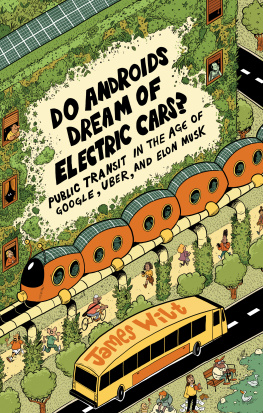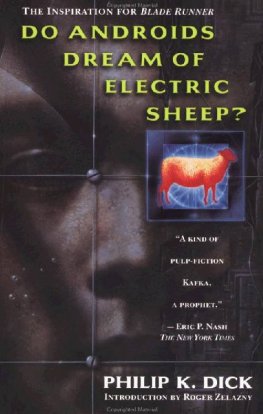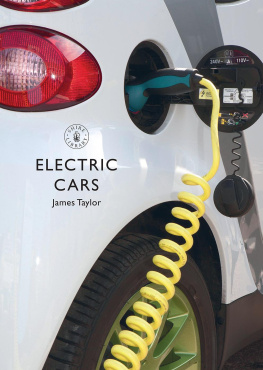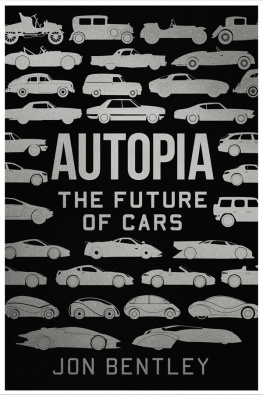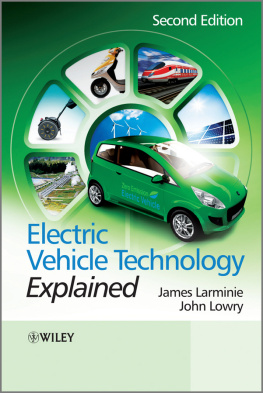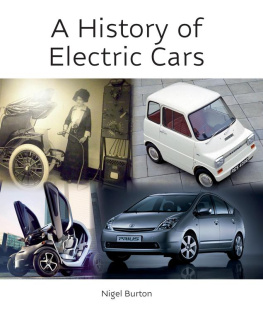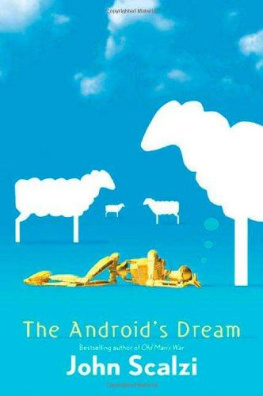James Wilt - Do Androids Dream of Electric Cars?
Here you can read online James Wilt - Do Androids Dream of Electric Cars? full text of the book (entire story) in english for free. Download pdf and epub, get meaning, cover and reviews about this ebook. year: 2020, publisher: Between the Lines, genre: Politics. Description of the work, (preface) as well as reviews are available. Best literature library LitArk.com created for fans of good reading and offers a wide selection of genres:
Romance novel
Science fiction
Adventure
Detective
Science
History
Home and family
Prose
Art
Politics
Computer
Non-fiction
Religion
Business
Children
Humor
Choose a favorite category and find really read worthwhile books. Enjoy immersion in the world of imagination, feel the emotions of the characters or learn something new for yourself, make an fascinating discovery.
- Book:Do Androids Dream of Electric Cars?
- Author:
- Publisher:Between the Lines
- Genre:
- Year:2020
- Rating:4 / 5
- Favourites:Add to favourites
- Your mark:
- 80
- 1
- 2
- 3
- 4
- 5
Do Androids Dream of Electric Cars?: summary, description and annotation
We offer to read an annotation, description, summary or preface (depends on what the author of the book "Do Androids Dream of Electric Cars?" wrote himself). If you haven't found the necessary information about the book — write in the comments, we will try to find it.
James Wilt: author's other books
Who wrote Do Androids Dream of Electric Cars?? Find out the surname, the name of the author of the book and a list of all author's works by series.
Do Androids Dream of Electric Cars? — read online for free the complete book (whole text) full work
Below is the text of the book, divided by pages. System saving the place of the last page read, allows you to conveniently read the book "Do Androids Dream of Electric Cars?" online for free, without having to search again every time where you left off. Put a bookmark, and you can go to the page where you finished reading at any time.
Font size:
Interval:
Bookmark:

As Wilt argues with vigour, egomaniac billionaires will not save us. But if people fight together for transitmassively expanded, truly accessible, publicly owned, democratically controlled, and hell, why not freewell, we might just be on a fast track to winning the world we need.
Avi Lewis , filmmaker and co-founder of The Leap
Will electric cars and ride-sharing platforms solve climate change? For James Wilt, these supposedly eco-friendly innovations are the latest in a long history of profit-driven threats to public transit. Wilt debunks the hype surrounding electric, autonomous vehicles and makes the case for a decarbonized future that guarantees mobility for everyone.
Shelagh Pizey-Allen , executive director of TTCriders
In 2020, we stand at a critical juncture: will we democratize and decarbonize mass transit systemsor will we allow private electric vehicles to dominate our streets? In this lucid, accessible, and sharply argued book, James Wilt presents an inspiring vision of mobility justice for transit workers, riders, and broader communities. In the process, he deftly critiques the twin paradigms of automobility and austerity, which threaten to dismantle public transit in the United States, Canada, and beyond.
Thea Riofrancos , co-author of A Planet to Win: Why We Need a Green New Deal
James Wilts new book blows open the false promises and dead ends of individualized, tech-savvy, platform-based solutions to our collective need to get around. In their place Wilt recovers a demand of public transit for all, with the needs of groups like the disabled and the health of our planetary systems driving his case. If youre looking for a radical orientation to the problems of transit, get this book.
Alex Birnel , Texas voting rights advocate and community organizer
Wilt cuts through the narratives of Silicon Valley billionaires and lays bare the equity problems with ride-hailing services, electric cars, and autonomous vehicles, while making the essential case that only a massive reinvestment in public transit with democratic, community control can achieve a future of transportation that is inclusive and sustainable. A must-read for anyone who cares about building a transport system that truly serves everyone while addressing the climate crisis.
Paris Marx , freelance writer and editor of Radical Urbanist
In this very readable and strategically important book, Wilt identifies the centrality of public transit in key issues of our time: the environment, the urban crisis, inequality, and the ebb of the social. Rejecting tinkering and technical fixes, he argues, with admirable confidence, for a radical politics that once again places public ownership and democratic planning on the public agenda.
Sam Gindin , co-author of The Making of Global Capitalism
Well-researched and timely, Wilts book is a must-read for those interested in the nitty-gritty of climate politics. An engaging combination of data and political imagination, Do Androids Dream of Electric Cars? provides an important window into how revitalizing public transportation can address inequality and climate change in one fell swoop.
Jessica F. Green , associate professor of political science, University of Toronto
As the corporate class tries to squeeze every last breath from workers and the planet, Wilts book presents a long-awaited, sharply written, and indispensible blueprint for how to analyze and organize around mobility justice as a core pillar of climate justice. Itll read even better on your commute!
Simran Dhunna , organizer Climate Justice Toronto & Peel
Wilt makes quick work dismantling the pervasive automobile industry myths that scaffold our car-dominant society. He provides both a road map for activists to internalize how our struggles over public transit are connected to other struggles and a vision of public transportation as the foundation of a truly just and democratic society.
Kate Jacobson , labour organizer and podcast host of Alberta Advantage
This book is a gift to the climate justice movementone that could not have come at a better time. As organizers around the world are forced to confront the overlapping crises of white supremacy, capitalism, and climate change, Wilt makes clear why public transit is one of the most strategic points of intervention we have to building a better world.
Emma Jackson , organizer with Climate Justice Edmonton and 350.org
Do Androids Dream of Electric Cars?
2020 James Wilt
First published in 2020 by
Between the Lines
401 Richmond Street West
Studio 281
Toronto, Ontario M5V 3A8
Canada
1-800-718-7201
www.btlbooks.com
All rights reserved. No part of this publication may be photocopied, reproduced, stored in a retrieval system, or transmitted in any form or by any means, electronic, mechanical, recording, or otherwise, without the written permission of Between the Lines, or (for copying in Canada only) Access Copyright, 69 Yonge Street, Suite 1100, Toronto, ON M5E 1K3.
Every reasonable effort has been made to identify copyright holders. Between the Lines would be pleased to have any errors or omissions brought to its attention.
Cataloguing in Publication information available from Library and Archives Canada
ISBN 9781771134484
EPUB ISBN 9781771134491
Text design by DEEVE
Cover design by Danesh Mohiuddin
Printed in Canada
We acknowledge for their financial support of our publishing activities: the Government of Canada; the Canada Council for the Arts; and the Government of Ontario through the Ontario Arts Council, the Ontario Book Publishers Tax Credit program, and Ontario Creates.

In memory of Larry J. Hanley (19562019), international president of the Amalgamated Transit Union
The slow bleed
Transit doesnt require years more testing, thousands of engineers, and tens of billions of dollars more in investments to perfect; we know that buses, trains, and streetcars work, as they have for over a century.
We once dreamed of a world without cars. Early science fiction is littered with futuristic promises of public transportation. When the Sleeper Wakes by H.G. Wells, published in 1899, featured rapidly moving sidewalks with seats, kiosks, and an innumerable and wonderfully diversified multitude of people. Stanley G. Weinbaums 1935 The Worlds of If speculated about a crowded but friendly trans-oceanic rocket. In Ray Bradburys 1950s classic Fahrenheit 451, protagonist Guy Montag rode a silent air-propelled train [that] slid soundlessly down its lubricated flue in the earth and let him out onto the cream tiled escalator rising to the suburb.
As the twentieth century wore on, depictions of transportation veered toward the privatized, with the flying cars, jetpacks, and speeders in The Jetsons and Star Wars capturing the public imagination. Yet the curious presence of public transit lingered, mostly as convenient prop: the backdrop of action movies like Speed and Mission: Impossible, or a locale for somewhat inconvenient or bizarre meetings, meditations, or getaways. Stranger Than Fictions Harold Crick reads a fateful manuscript on the night bus until it pulls into the depot. Clementine and Joel have an awkwardly adorable meeting on the Long Island Rail Road in
Font size:
Interval:
Bookmark:
Similar books «Do Androids Dream of Electric Cars?»
Look at similar books to Do Androids Dream of Electric Cars?. We have selected literature similar in name and meaning in the hope of providing readers with more options to find new, interesting, not yet read works.
Discussion, reviews of the book Do Androids Dream of Electric Cars? and just readers' own opinions. Leave your comments, write what you think about the work, its meaning or the main characters. Specify what exactly you liked and what you didn't like, and why you think so.

